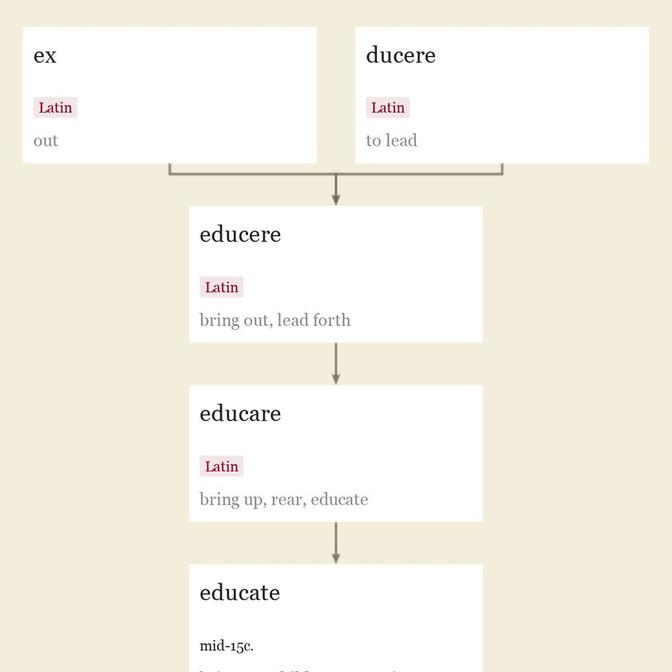The understanding we have of the world we live, including what knowledge is, what existence and consciousness is, how the human mind functions, as well as views on what is right and wrong, and therefore what should be done and what not, has consequences for what we think of education, including what is considered worthwhile teaching to whom, when, where, how and even by whom or in an age of increasingly depersonalized teaching by what. These subjects are within the scope of the philosophy of education and educational psychology.
The motivation for beginning this thread was that there does not seem to be a thread with this angle, but also the subjects interests me, and it did not fit into any of these thread either: Homeschooling, home education, school education and the upbringing of children or Transcripts related to children. In this post there are excerpts from the Wiki and reference work. Questions will come later.
Education and educational. The Online Etymology Dictionary has
Next the philosophy of education. In the first paragraph on the Stanford resource on philosophy, there is:
Arabic: فلسفة لتربية (If you translated this entry, there is a long list of philosophers)
Chinese: 教育哲學 (Includes also Chinese philosophers)
Danish: Pædagogisk filosofi
Dutch: Filosofie van de opvoeding
English: Philosophy of Education
Finnish: Kasvatusfilosofia (Short, but has links to authors considered influential.)
French: Philosophie de l'éducation
German: Bildungstheorie
Hebrew: פילוסופיה של החינוך (Covers a wide range of philosophies and approaches.)
Norwegian: Pedagogisk filosofi
Portuguese: Filosofia da educação
Russian: Философия образования
Spanish: Filosofia de la educación
Swedish: Pedagogikens filosofi
In the English Wiki on the Philosophy of Education, there are the following names with those bolded also appearing in Educational Psychology.
The Wiki on Educational psychology
The motivation for beginning this thread was that there does not seem to be a thread with this angle, but also the subjects interests me, and it did not fit into any of these thread either: Homeschooling, home education, school education and the upbringing of children or Transcripts related to children. In this post there are excerpts from the Wiki and reference work. Questions will come later.
Education and educational. The Online Etymology Dictionary has
education (n.)
1530s, "child-rearing," also "the training of animals," from French education (14c.) and directly from Latin educationem (nominative educatio) "a rearing, training," noun of action from past-participle stem of educare (see educate). Originally of instruction in social codes and manners; meaning "systematic schooling and training for work" is from 1610s.
educate (v.)
mid-15c., educaten, "bring up (children), to train," from Latin educatus, past participle of educare "bring up, rear, educate" (source also of Italian educare, Spanish educar, French éduquer), which is a frequentative of or otherwise related to educere "bring out, lead forth," from ex- "out" (see ex-) + ducere "to lead," from PIE root *deuk- "to lead." Meaning "provide schooling" is first attested 1580s. Related: Educated; educating.
According to "Century Dictionary," educere, of a child, is "usually with reference to bodily nurture or support, while educare refers more frequently to the mind," and, "There is no authority for the common statement that the primary sense of education is to 'draw out or unfold the powers of the mind.'"
co-education (n.)
also coeducation, "joint education," specifically of young men and young women in the same institution, 1852, from co- + education.
Next the philosophy of education. In the first paragraph on the Stanford resource on philosophy, there is:
There is quite a variety of content on the Wikipedia from different countries. Below are examples, which also has translations of the concept to other languages. There are more Wikis, but I took the longer ones.Philosophy of Education
First published Mon Jun 2, 2008; substantive revision Sun Oct 7, 2018
Philosophy of education is the branch of applied or practical philosophy concerned with the nature and aims of education and the philosophical problems arising from educational theory and practice. Because that practice is ubiquitous in and across human societies, its social and individual manifestations so varied, and its influence so profound, the subject is wide-ranging, involving issues in ethics and social/political philosophy, epistemology, metaphysics, philosophy of mind and language, and other areas of philosophy. Because it looks both inward to the parent discipline and outward to educational practice and the social, legal, and institutional contexts in which it takes place, philosophy of education concerns itself with both sides of the traditional theory/practice divide. Its subject matter includes both basic philosophical issues (e.g., the nature of the knowledge worth teaching, the character of educational equality and justice, etc.) and problems concerning specific educational policies and practices (e.g., the desirability of standardized curricula and testing, the social, economic, legal and moral dimensions of specific funding arrangements, the justification of curriculum decisions, etc.). In all this the philosopher of education prizes conceptual clarity, argumentative rigor, the fair-minded consideration of the interests of all involved in or affected by educational efforts and arrangements, and informed and well-reasoned valuation of educational aims and interventions.
Arabic: فلسفة لتربية (If you translated this entry, there is a long list of philosophers)
Chinese: 教育哲學 (Includes also Chinese philosophers)
Danish: Pædagogisk filosofi
Dutch: Filosofie van de opvoeding
English: Philosophy of Education
Finnish: Kasvatusfilosofia (Short, but has links to authors considered influential.)
French: Philosophie de l'éducation
German: Bildungstheorie
Hebrew: פילוסופיה של החינוך (Covers a wide range of philosophies and approaches.)
Norwegian: Pedagogisk filosofi
Portuguese: Filosofia da educação
Russian: Философия образования
Spanish: Filosofia de la educación
Swedish: Pedagogikens filosofi
In the English Wiki on the Philosophy of Education, there are the following names with those bolded also appearing in Educational Psychology.
- 5History
- 5.1Ancient
- 5.2Medieval
- 5.3Modern
- 5.420th and 21st century
- 5.4.1Rudolf Steiner (Waldorf education)
- 5.4.2John Dewey
- 5.4.3Maria Montessori
- 5.4.4William Heard Kilpatrick
- 5.4.5William Chandler Bagley
- 5.4.6A. S. Neill
- 5.4.7Martin Heidegger
- 5.4.8Jean Piaget
- 5.4.9Mortimer Jerome Adler
- 5.4.10Harry S. Broudy
- 5.4.11Jerome Bruner
- 5.4.12Paulo Freire
- 5.4.13John Holt
- 5.4.14Nel Noddings
The Wiki on Educational psychology
Names in the English Wiki on Educational Psychology include:Educational psychology is the branch of psychology concerned with the scientific study of human learning. The study of learning processes, from both cognitive and behavioral perspectives, allows researchers to understand individual differences in intelligence, cognitive development, affect, motivation, self-regulation, and self-concept, as well as their role in learning. The field of educational psychology relies heavily on quantitative methods, including testing and measurement, to enhance educational activities related to instructional design, classroom management, and assessment, which serve to facilitate learning processes in various educational settings across the lifespan.[1]
Educational psychology can in part be understood through its relationship with other disciplines. It is informed primarily by psychology, bearing a relationship to that discipline analogous to the relationship between medicine and biology. It is also informed by neuroscience. Educational psychology in turn informs a wide range of specialities within educational studies, including instructional design, educational technology, curriculum development, organizational learning, special education, classroom management, and student motivation. Educational psychology both draws from and contributes to cognitive science and the learning sciences. In universities, departments of educational psychology are usually housed within faculties of education, possibly accounting for the lack of representation of educational psychology content in introductory psychology textbooks.[2]
The field of educational psychology involves the study of memory, conceptual processes, and individual differences (via cognitive psychology) in conceptualizing new strategies for learning processes in humans. Educational psychology has been built upon theories of operant conditioning, functionalism, structuralism, constructivism, humanistic psychology, Gestalt psychology, and information processing.[1]
Educational psychology has seen rapid growth and development as a profession in the last twenty years.[3] School psychology began with the concept of intelligence testing leading to provisions for special education students, who could not follow the regular classroom curriculum in the early part of the 20th century.[3] However, "school psychology" itself has built a fairly new profession based upon the practices and theories of several psychologists among many different fields. Educational psychologists are working side by side with psychiatrists, social workers, teachers, speech and language therapists, and counselors in an attempt to understand the questions being raised when combining behavioral, cognitive, and social psychology in the classroom setting.[3]
Other topics that may relate are education, preschool, kindergarten, primary education, school, secondary school, homeschooling, college, university and many more. So much for introduction.
- 1History
- 1.1Antiquity (Plato and Aristotle)
- 1.2Early Modern era (John Locke)
- 1.3Before 1890
- 1.41890–1920
- 1.51920–present
- 2Perspectives
- 3Conditioning and learning
- 4Technology
- 5Applications
- 6Methods of research
Last edited:


